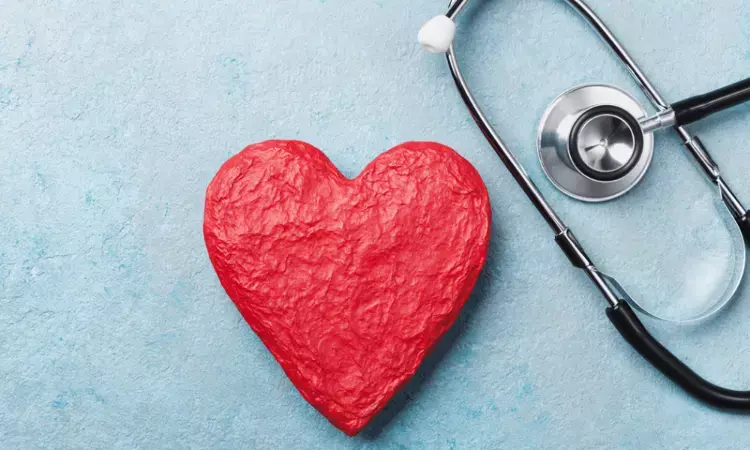- Home
- Medical news & Guidelines
- Anesthesiology
- Cardiology and CTVS
- Critical Care
- Dentistry
- Dermatology
- Diabetes and Endocrinology
- ENT
- Gastroenterology
- Medicine
- Nephrology
- Neurology
- Obstretics-Gynaecology
- Oncology
- Ophthalmology
- Orthopaedics
- Pediatrics-Neonatology
- Psychiatry
- Pulmonology
- Radiology
- Surgery
- Urology
- Laboratory Medicine
- Diet
- Nursing
- Paramedical
- Physiotherapy
- Health news
- Fact Check
- Bone Health Fact Check
- Brain Health Fact Check
- Cancer Related Fact Check
- Child Care Fact Check
- Dental and oral health fact check
- Diabetes and metabolic health fact check
- Diet and Nutrition Fact Check
- Eye and ENT Care Fact Check
- Fitness fact check
- Gut health fact check
- Heart health fact check
- Kidney health fact check
- Medical education fact check
- Men's health fact check
- Respiratory fact check
- Skin and hair care fact check
- Vaccine and Immunization fact check
- Women's health fact check
- AYUSH
- State News
- Andaman and Nicobar Islands
- Andhra Pradesh
- Arunachal Pradesh
- Assam
- Bihar
- Chandigarh
- Chattisgarh
- Dadra and Nagar Haveli
- Daman and Diu
- Delhi
- Goa
- Gujarat
- Haryana
- Himachal Pradesh
- Jammu & Kashmir
- Jharkhand
- Karnataka
- Kerala
- Ladakh
- Lakshadweep
- Madhya Pradesh
- Maharashtra
- Manipur
- Meghalaya
- Mizoram
- Nagaland
- Odisha
- Puducherry
- Punjab
- Rajasthan
- Sikkim
- Tamil Nadu
- Telangana
- Tripura
- Uttar Pradesh
- Uttrakhand
- West Bengal
- Medical Education
- Industry
Testosterone not associated with an increase in incident CV events: Study

Testosterone use was not associated with an increase in incident CV events in this patient population, suggests a study published in the Journal of the American Heart Association.
Testosterone treatment is common in men, although risks for major cardiovascular events are unclear.
A group of researchers from U.S.A conducted in US male veterans, aged ≥40 years, with low serum testosterone and multiple medical comorbidities and without a history of myocardial infarction, stroke, venous thromboembolism, prostate cancer, or testosterone treatment in the prior year.
For the primary outcome, we examined if testosterone treatment was associated with a composite cardiovascular outcome (incident myocardial infarction, ischemic stroke, or venous thromboembolism).
Testosterone use was modelled as intramuscular or transdermal and as current use, former use, and no use. Current testosterone users were compared with former users to reduce confounding by indication.
The results of the study are as follows:
· The cohort consisted of 204 857 men with a mean (SD) age of 60.9 (9.9) years and 4.7 (3.5) chronic medical conditions.
· During follow‐up of 4.3 (2.8) years, 12 645 composite cardiovascular events occurred.
· In adjusted Cox regression analyses, current use of transdermal testosterone was not associated with risk for the composite cardiovascular outcome in those without prevalent cardiovascular disease, and in those with prevalent cardiovascular disease was associated with lower risk.
· In similar analyses, current use of intramuscular testosterone was not associated with risk for the composite cardiovascular outcome in men without or with prevalent cardiovascular disease.
The researchers concluded that in a large cohort of men without a history of myocardial infarction, stroke, or venous thromboembolism, testosterone treatment was not associated with increased risk for incident composite cardiovascular events.
Reference:
Association Between Testosterone Treatment and Risk of Incident Cardiovascular Events Among US Male Veterans with Low Testosterone Levels and Multiple Medical Comorbidities by Shores M et. al published in the Journal of the American Heart Association.
https://doi.org/10.1161/JAHA.120.020562
Dr. Shravani Dali has completed her BDS from Pravara institute of medical sciences, loni. Following which she extensively worked in the healthcare sector for 2+ years. She has been actively involved in writing blogs in field of health and wellness. Currently she is pursuing her Masters of public health-health administration from Tata institute of social sciences. She can be contacted at editorial@medicaldialogues.in.
Dr Kamal Kant Kohli-MBBS, DTCD- a chest specialist with more than 30 years of practice and a flair for writing clinical articles, Dr Kamal Kant Kohli joined Medical Dialogues as a Chief Editor of Medical News. Besides writing articles, as an editor, he proofreads and verifies all the medical content published on Medical Dialogues including those coming from journals, studies,medical conferences,guidelines etc. Email: drkohli@medicaldialogues.in. Contact no. 011-43720751


